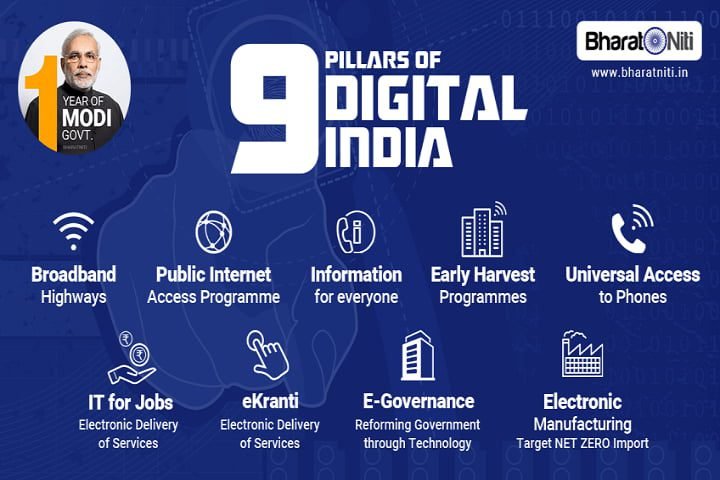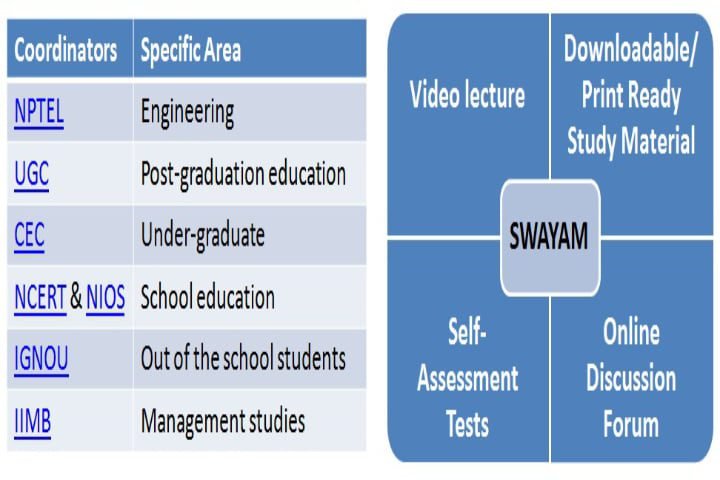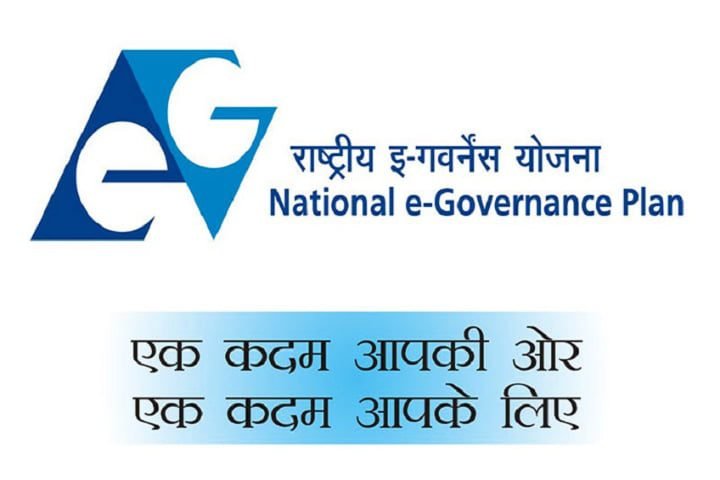e-Governance is the integration of Information and Communication Technology (ICT) in all the processes of government to enhance its ability to address the needs of the general public.
In This Article
The National e-Governance Plan (NeGP) is an initiative of the Government of India to make all government services available to the citizens of India through digital platforms. NeGP was formulated by the erstwhile Department of Electronics and Information Technology and the Department of Administrative Reforms and Public Grievances.
Digital India
In the mid-90s, many e-governance initiatives to provide citizen-centric services were initiated. The National e-Governance Plan (NeGP) in 2006 was a significant milestone in this step.
At the onset, NeGP consisted of 27 Mission Mode Projects (MMP) and 8 components in 2006. In 2011, 4 additional projects – Health, Education, PDS and Posts were added to increase the count to 31 MMP. A massive countrywide infrastructure, even to the remotest of villages was initiated, along with the large-scale digitization of records to enable easy, reliable access over the internet.
The Ministry of Electronics & Information Technology established the National e-Governance Division (NeGD) as an Independent Business Division under the Media Lab Asia in 2009.
e-Kranti: National e-Governance Plan 2.0
e-Kranti, or National e-Governance Plan 2.0, is a government initiative that aimed to address the shortcomings of previous NeGP, by incorporating all new and ongoing e-Governance projects as well as the existing projects, with the vision of “Transforming e-Governance for Transforming Governance”. The program was approved in 2015 as part of the Digital India initiative.
Under e-Kranti, the portfolio of MMP has increased from 31 to 44. Many new social sector projects, namely Women and Child Development, Social Benefits, Financial Inclusion, Urban Governance eBhasha, etc., have been added as new MMPs.
A not-for-profit Company, Digital India Corporation (DIC), was set up by the Ministry of Electronics and Information Technology (MeitY), Govt. of India, in September 2017 by changing the name of erstwhile Media Lab Asia. DIC leads and guides in realizing the Digital India program’s vision, objectives and goals.
It provides strategic support to various government divisions to realise Digital India’s mission by building capacity, promoting best practices, encouraging Public-Private Partnerships (PPP), and developing innovation and technology for e-governance projects.
NeGD has developed and is managing several National Public Digital Platforms, such as:
- DigiLocker
- UMANG
- Rapid Assessment System
- OpenForge
- API Setu
- Poshan Tracker
- Academic Bank of Credits
- National Academic Depositories
- National AI Portal
- MyScheme
- India Stack Global
- Meri Pehchaan


Digital India Corporation consists 6 different divisions:
- Technology Development & Deployment Division (TDDD)
- NeGD (National e-Governance Division)
- MyGov
- MeitY Startup Hub (MSH)
- India Semiconductor Mission (ISM)
- Digital India Bhashini Division (DIBD)
To change the entire ecosystem of public services through information technology, the Digital India programme was launched by the Government of India with a vision to transform India into a digitally empowered society and knowledge economy.
There are a few agencies which support the Digital India initiatives:
1. Controller of Certifying Authorities (CCA)
The Certifying Authorities (CAs) issue Digital Signature Certificates (DSC) for electronic authentication of users. Its aim is to promote the growth of e-commerce and eGovernance through the wide use of digital signatures.
Digital Signature Certificates
Certificates serve as proof of an individual’s identity for a particular purpose; for example, a driver’s license identifies someone who can legally drive in a particular country.
A digital certificate can be presented electronically to prove one’s identity, access information or services online, or sign certain documents digitally.
Digital signature certificates are the digital equivalent of paper certificates (driver’s licenses, passports).
There are a few licensed Certifying Authority (CA) in India that have been granted a license to issue a digital signature certificate under Section 24 of the Indian IT Act 2000.
2. Centre for Development of Advanced Computing (C-DAC)
C-DAC works to strengthen national technological capabilities in the context of global developments in the advanced computing field and responds to changes in the market need.
3. Centre for Railway Information Systems (CRIS)
It is an autonomous organization under the Ministry of Railways. It develops and manages the Information Technology applications of the Indian Railways.
4. Common Services Center (CSC)
CSCs are the access points for delivering various electronic services to villages in India. CSC has been a game changer in contributing to a digitally and financially inclusive society. It has become the promotor of rural entrepreneurship and building rural capacities and livelihoods.
5. Department of Agriculture Cooperation and Farmers Welfare (DAC&FW)
DAC&FW coordinates with state-level agencies and implements Central Sector Schemes in Agriculture and Farmer Welfare.
6. Small Farmers Agribusiness Consortium (SFAC)
It is another autonomous body promoted by the Ministry of Agriculture Cooperation and Farmers’ Welfare, focused on increasing the incomes of small and marginal farmers through aggregation and development of agribusiness.
7. Department of Empowerment of Persons with Disabilities (DEPWD)
DEPWD is under the Ministry of Social Justice & Empowerment, facilitating the empowerment of persons with disabilities. As per Census 2011, 2.68 crore, i.e. 2.21 per cent of the country’s total population, have some form of disability that includes persons with Seeing, Hearing, Speech, Movement, Mental Retardation, Mental Illness, Multiple Disability and any other disabilities.


8. Department of Financial Services
It covers the functioning of Banks, Financial Institutions, Insurance Companies and the National Pension System.
9. Department of Industrial Policy & Promotion (DIPP)
It is responsible for formulating and implementing promotional and developmental measures for the growth of the industrial sector, keeping in view the national priorities and socio-economic objectives.
10. Department of Science & Technology (DST)
It promotes new areas of science and technology and plays the role of a nodal department for organising, coordinating and promoting science and technology activities in the country.
A few significant initiatives of Digital India which is related to education and skill development are:
SWAYAM
SWAYAM is a programme initiated by the Government of India to bridge the digital divide through an indigenous developed IT platform to take the best teaching and learning resources free of cost to the residents in India.
SWAYAM platform is indigenously developed under the erstwhile Ministry of Human Resource Development (MHRD)and All India Council for Technical Education (AICTE) with the help of Microsoft.
National Coordinators for SWAYAM:


STARTUP INDIA
Startup India is a flagship initiative of the Government of India, intended to build a strong ecosystem for nurturing innovation and Startups in the country that will drive sustainable economic growth and generate large-scale employment opportunities.
Through this initiative, the government aims to empower Startups to grow through innovation and design.
Startup India initiatives are based on the following pillars:
- Simplification and Handholding
- Funding Support and Incentives
- Industry-Academia Partnership and Incubation
Under this initiative, a startup has been defined as an entity headquartered in India, opened less than seven years ago, and has an annual turnover of less than 25 crore.
Pradhan Mantri Mudra Yojana (PMMY) was also launched to support this initiative in April 2015, which aims to provide micro-finance, low-interest rate loans to entrepreneurs from low socio-economic backgrounds.
MUDRA has created three products, namely:
- Shishu (covering loans up to Rs. 50,000)
- Kishore (covering loans above Rs. 50,000 and up to Rs. 5,00,000)
- Tarun (covering loans above Rs. 5,00,000 and up to Rs. 10,00,000)
It aimed to signify the stage of growth/development and funding needs of the beneficiary micro unit/entrepreneur and also provide a reference point for the next phase of graduation/growth.
All Non-Corporate Small Business Segment (NCSBS) comprising of proprietorship or partnership firms running as small manufacturing units, service sector units, shopkeepers, fruits/vegetable vendors, truck operators, food-service units, repair shops, machine operators, small industries, food processors and others in rural and urban areas, are eligible for assistance under Mudra.
The borrower can approach either Commercial Banks, RRBs, Small Finance Banks, MFIs and NBFCs or apply online through this portal www.udyamimitra.in.




